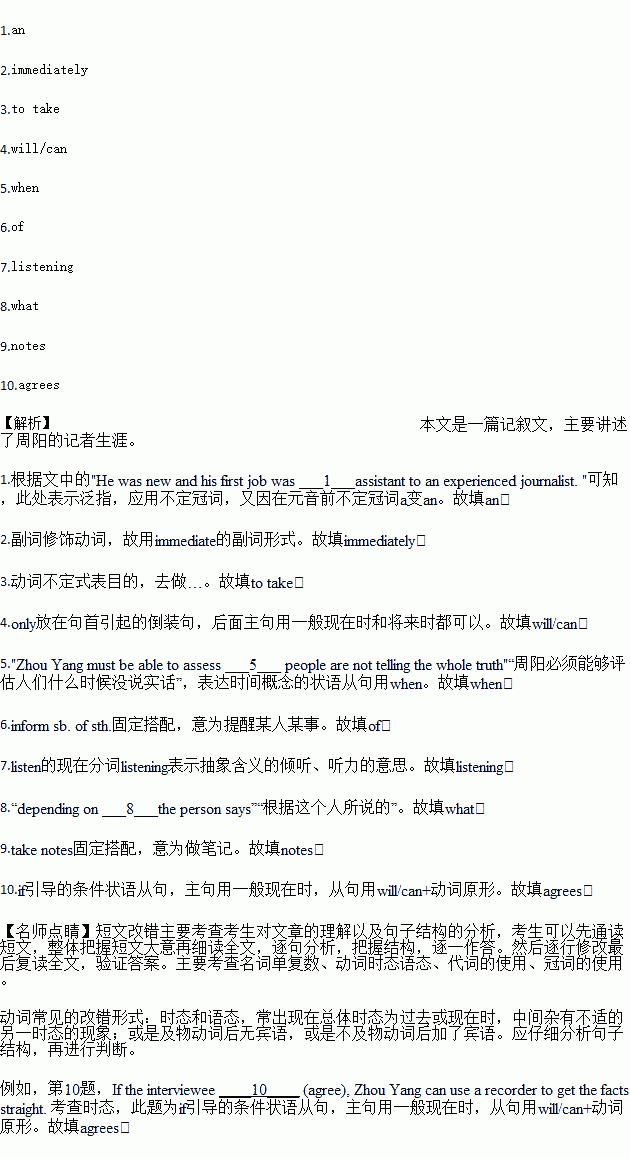题目内容
Zhou Yang worked as a journalist in a popular English newspaper. He was new and his first job was 1.assistant to an experienced journalist. Zhou Yang couldn’t go out on a story 2.(immediate) because he needed to be more experienced. At the beginning, Zhou Yang hand a professional photographer with him 3.(take) photographs and his colleague was eager to assist him. As a journalist, Zhou Yang needs to be curious, because only by asking many difficult questions 4.he acquire all the information he needs to know. That means Zhou Yang must be able to assess 5. people are not telling the whole truth and then try to discover it. He must use research to inform himself6.the missing part of the story. During an interview, 7.(listen)is very important. Zhou Yang has to listen for detailed facts. Meanwhile he has to prepare next question depending on 8.the person says. This requires Zhou Yang not only listens carefully, but also take 9.note) at the same time. If the interviewee 10. (agree), Zhou Yang can use a recorder to get the facts straight.
 新思维假期作业寒假吉林大学出版社系列答案
新思维假期作业寒假吉林大学出版社系列答案A study published Monday found that people who sleep less tend to be fat,and experts said it’s time to find out if more sleep will fight fatness.
“We’ve put so much emphasis on diet and exercise that we’ve failed to recognize the value of good sleep,”said Fred Turek,a physician at Northwestern University.
Monday’s study from Eastern Virgnia Medical School in Norfolk covered 1,000 people and found that total sleep time decreased as body mass index-a measure of weight based on height increased.
“Men slept an average of 27 minutes less than women and overweight and fat patients slept less than patients with normal weights,”it said.In general the fatter subjects slept about 1.8 hours a week less than those with normal weights.
“Americans experience insufficient sleep and fat bodies.Clinicians are aware of the burden of fatness on patients,”the study said.
“Our findings suggest that major extensions of sleep time may not be necessary,as an extra 20 minutes of sleep per night seems to be associated with a lower body mass index,”it added.
“We caution that this study does not set up a cause?and?effect relationship between restricted sleep and fatness,but investigations indicating success in weight loss via extensions of sleep would help greatly to set up such a relationship.”
The study was published in the Archives of Internal Medicine along with an editorial by Turek and Northwestern colleague Joseph Bass commenting on it and related research.
Inan interview,Turek said some studies have shown the lack of sleep causes declines in an appetiteholding back protein hormone,and increases in another hormone that cause a longing for food.“In addition neuropathies(神经疗法)in the brain governing sleep and fatness appear to overlap(部分重叠),”he said.
“Fatness has been rising dramatically in developed countries and reached epidemic(流行病)levels in the United States,”it added,“leading to a variety of health problems.”
A new study having been 1. | |||
2. | in the past | diet and 3. | |
this time | sleep | ||
A study from Eastern Virginia Medical School | People | 1,000 were 4. | |
difference | Men slept 27ms less than women on 5. | ||
Americans' problem | 6. sleep and fat bodies | ||
conclusion | Weight loss set up 7. between sleep & fatness. | ||
Reason | Less sleep causes protein hormone to 8. | ||
concern | developing countries | rising with 9.speed | |
in the USA | quite 10. | ||



 sman Andreas Leo.
sman Andreas Leo. se one or the other or can I keep both my husband and my new career?
se one or the other or can I keep both my husband and my new career?